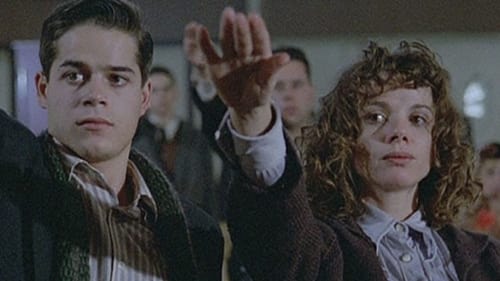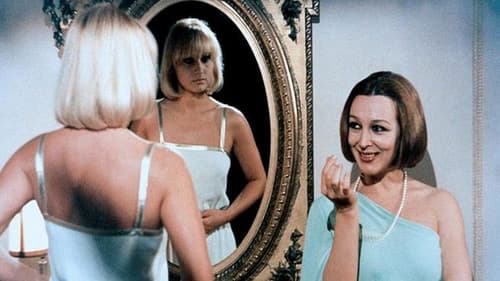
Esposa Mulie
A group of Africans clandestinely reaches the coast of southern Spain. Among them is Alou, a 28 years old Senegalese. As all his belongings are stolen while in Almsería, he has no choice but to engage in street vending. His only pleasure are the letters he writes to his family to tell the vicissitudes of his Spanish adventure.

Rubianca
In the post Spanish civil war years, Catalan kids would sit in circles among the ruins and tell stories, known as "aventis" (the film's original title in Catalan, its original language). These tales mix war stories, local gossip, comic book characters, fantasy and real events. The "aventis" told in this film are told in flashback. In the mid 80s, 45 or so years after the age of the "aventis," a doctor and a nurse-nun (who grew up together, and now are co-workers in a hospital) identify the corpse of one of the main characters of the "aventis" of their childhood and adolescence. Besides the interesting flashbacks - a chronical of the Civil War in a "typical" Barcelona microcosm itself, the discovery of this body (belonging to someone long presumed dead) leads to other surprises and unresolved doubts, several decades later

Spanish actress María de Montenegro marries a Nazi officer, von Herzig, in Berlin during World War II, and years later is forced to return to Barcelona. There she hopes to find what could be her last chance to regain her lost success.

Short film by Antoni Padrós

Maria
In a small Catalan village take advantage of the visit of an ecclesiastical authority of Rome, during vacations, to organize a conference on the topic of religion and sex. This causes the people to divide into two camps, those who favor and those against the "Congress", until finally after a series of negotiations between both sides, we arrive at consensus. A large mosaic of characters carry the story to end happily, through critical situations with the conservative church.

Mother
This movie is the first of a trilogy that Sebastián D'Arbó, a specialist in parapsychology, filmed on occult topics. The second film is El ser (1982) and the last one Más allá de la muerte (1986).

Julia

Criada

Petrus
Leonor and Juan are a united couple of good standing that cannot have children. They want to adopt one but do not succeed because he is too old. Leonor proposes Juan an audacious plan: having a child with another woman, offering her a significant amount of money if she renunciates to the child. As it is very difficult to find the girl, they publish an advertisement in the press. Ana finally applies, as she has no job and lives far away from his family, so she accepts the deal.

Fanny
José Maria is a seventeen year old boy; his father is a successful restaurant owner in a town some distance from Barcelona, in Spain. The boy is intelligent and sensitive, but his mannerisms and habits, and lack of masculine drive, lead him to get bullied at school. The school principal decides that José is the disruptive influence, and asks for him to be removed from the school. The father berates the boy, and his mother, for his failure to be a red-blooded young man, and sends him away for a while to live with a friend in the country. Father visits the boy, and takes him to a strip club in Barcelona, run by a lady friend of his, intending that this will "cure" him of his sexual reserve. However one of the acts is a pre-operative transsexual, and there is a full frontal exposure at the end. Father has arranged that after the show...

Isabel

A humorously distorted version of the life of Shirley Temple, and described by its director as a terrorist musical. Shirley Temple sets off for the Emerald City to tell the Wizard that she is upset that Judy Garland has been selected for the role of Dorothy in The Wizard of Oz. On this trip she is accompanied by a group of characters who make reference to a fragmented, bipolar society. The film was begun as Franco was ill and completed after his death, and makes reference to the oppression of Spain during this period.

Asunta
Season 1973-1974. After fourteen years of drought, the FC Barcelona of Johan Cruyff is making a spectacular campaign. Sebastián, a great fan of soccer, decides then to join a Barça's supporters club. There he will meet the daughter of his friend Amadeo, an attractive young woman who will not stop until Sebastián agrees to marry her. The couple will celebrate their wedding on the same day that Barça and Madrid compete for the League.

An allegory of political oppression under Franco, with a plot alternating between narrative sequences and dream-like moments styled after the Spanish avant garde. Padrós employs a range of musical forms including opera, scores, and choreography to underscore a plot featuring a group of dropouts living in a junkyard who try to re-integrate with "The System" as represented by a party.

Short film based on a real news item in which a student from Ohio was sentenced to spend three hours in a pigsty to learn to differentiate between a pig and a policeman. It shows a group of friends which make up a surreal symphony of people counting pigs and the actress Rosa Morata, dressed like a decadent cabaret performer, who unsuccessfully tries to escape from a runaway herd of men.

Short film that addresses family repression through the bond between a brother and a sister in which the stronger takes advantage of the weaker.

A tragedy that does not avoid irony while showing a couple in a romantically disastrous state.

Short film dedicated to the "established order" (yet made clearly outside of it) and drawing from the protests of 1968 and the struggle for socialist revolution, it also challenges the Catholicism and nationalism of Franco's Spain. It depicts the breakdown of a relationship, as the woman leaves for Germany where the Marxist struggle needs her help, and the man mocks her revolutionary ideals.

Dona
A short film about a mysterious ceremony, based on an essay by William S. Burroughs.

Cloe
Daphnis and Chloe wander through a forest, intercut with shots of John Lennon and Yoko Ono, and following no clear chronological trajectory, in a questioning of sexual roles and the permissible standards of Franco-era cinema.












